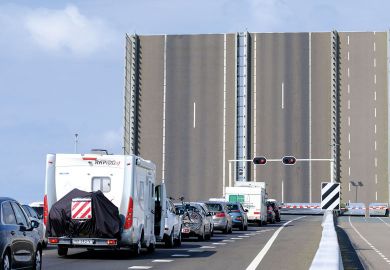Universities in the Netherlands have agreed to reduce the number of undergraduate programmes taught entirely in English, amid continuing pressure to reduce international student numbers.
In a letter to the education minister, Robbert Dijkgraaf, the umbrella body Universities Netherlands (UNL) announced provisional plans to increase Dutch-language instruction, with member institutions agreeing to either switch programmes entirely to Dutch, introduce a Dutch-language pathway to English-language programmes or introduce an enrolment quota for English-language pathways.
According to current proposals agreed by its members, UNL says, four bachelor’s programmes will be modified to be taught entirely in Dutch, 35 English-language programmes will add a Dutch-language option and 27 programmes will employ a quota for English admissions. Such quotas are not legally permissible at present but would be facilitated by the proposed Internationalisation in Balance bill, whose progress the letter calls on the government to “speed up”.
“Universities are taking a serious step in terms of balancing out greater internationalisation in education with student intake numbers,” Jouke de Vries, UNL’s acting president, said in a statement. “In order to do that effectively, we need the support of politicians – at the very least in the form of legal instruments made available in the very near future to be able to control the influx of students.”
Member universities hope to introduce these measures “as early as the 2025-2026 academic year”, UNL said in a statement, with the goal of “preserv[ing] the added value of internationalisation without adverse impact on the Netherlands”.
Campus resource collection: English as a second language in higher education
“Internationalisation is very important to the scientific community, our economy and the future of our students,” the statement read. “It contributes to a stimulating academic environment, responsiveness to international scientific developments and training a sufficient number of talented professionals for the labour market. In addition, international students also hold significant value for the Dutch economy.
“At the same time, universities recognise that internationalisation has also created several problems that have necessitated the above measures,” UNL said. Previously, the umbrella body has attributed issues including student housing shortages and a decline in education accessibility and quality to a growth in international student numbers.
Earlier this year, UNL agreed that its members would not develop any new English-language undergraduate programmes, would halt recruitment at international fairs and would scrap foundation years for overseas students. The move came after the Dutch House of Representatives instructed the government and higher education institutions to devise “concrete measures” to reduce English-language instruction.
Register to continue
Why register?
- Registration is free and only takes a moment
- Once registered, you can read 3 articles a month
- Sign up for our newsletter
Subscribe
Or subscribe for unlimited access to:
- Unlimited access to news, views, insights & reviews
- Digital editions
- Digital access to THE’s university and college rankings analysis
Already registered or a current subscriber?








